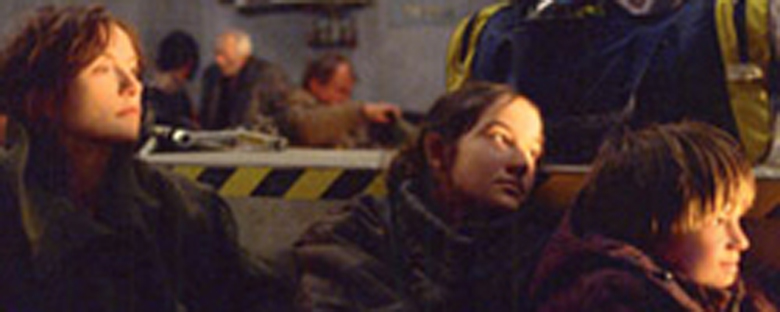Reviews
Le Temps du loup
Michael Haneke
France / Austria / Germany, 2003
Credits
Review by Matt Bailey
Posted on 14 December 2004
Source Palm Pictures DVD
Related articles
Reviews: Benny’s Video
Reviews: Caché
Reviews: Funny Games
Reviews: The Seventh Continent
Anne, her husband, and her children (Eva and Ben) travel to their cabin in the country. They enter the cabin to face a shotgun pointed at them. A man and his family have taken over the cabin and have no plans to leave. Anne’s family does not seem to be too terribly surprised by the presence of this man, though they are disturbed by his apparent hostility. It soon becomes clear that some sort of catastrophe has occurred that has driven people out of the cities to the calmer countryside, but whatever it is remains a mystery to the audience. A more immediate and personal apocalypse occurs, however, when the squatter shoots Anne’s husband, killing him instantly. Anne and her children are forced to drag the body out of the cabin and are sent on their way to beg food and shelter from their neighbors.
The films of Michael Haneke usually examine how everyday people react in extreme circumstances. While not as rigidly constructed as Funny Games, which details a savage home invasion and is set primarily in one small house; as ambitious as Code Unknown, which explores the aftermath of a single, random incident on the lives of otherwise unconnected people; or as psychologically complex as The Piano Teacher, which delves into the masochistic impulses of a woman brutally repressed by her mother, Time of the Wolf does not deviate from this characteristic preoccupation. While the disastrous event that led the film’s characters to drop from middle-class respectability to survival-driven foraging in nearly an instant remains unrevealed for the duration of the film, Haneke is interested solely in how the people of an established civilization begin life anew after the complete annihilation of that civilization. When money, class, position, name, and education no longer mean anything, how do people relate to one another? How do they establish a new civilization and on what is it based?
Haneke, as would be expected by anyone who has seen any of his previous work, only hints at answers to these questions. As a director and writer, he is an observer, not a manipulator. He refuses to allow contrivances of plot to determine character. He conversely allows the (sometimes irrational) motivations of the characters to dictate the plot. This often leaves his films open to criticism that they are rather thin on story and leaves Haneke susceptible to accusations of being talented only in cruelly making his audience squirm. While the former may arguably be true depending on how much narrative density one requires from films, the latter is unequivocally a falsehood. Though Haneke’s films may be difficult to watch at times, particularly when his camera refuses to flinch from a disturbing scene, they are essentially some of the most forgiving of human imperfection since the films of Bresson.
We don’t do comments anymore, but you may contact us here or find us on Twitter or Facebook.



